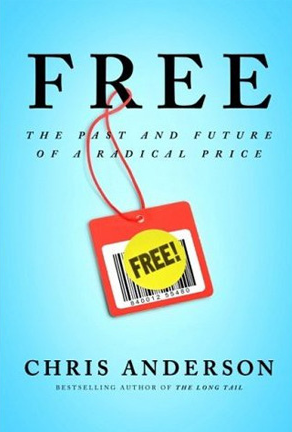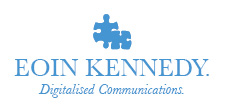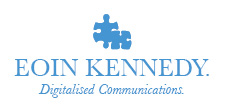Books I Read – No.2 – Free by Chris Anderson
I was asked to review the new book Free by Chris Anderson – Wired Editor and author of the Long Tail for Marketing Age Magazine. You can find the online version of the article here but you may need a subscription so I have included below also.
Its great to get a deadline for when you need to read and review a book as I find the books I should read mount up on the good intentions pile. So after a week of no TV and coffee after putting the baby to date, the results are below.
Free – The Future of a Radical Price – Chris Anderson

At first glance this book can appear quiet scary for a variety of industries whose main business model is now under threat but the deeper message is that free (mainly due to technology) is on a rapid rise and with it come huge changes in business structures but also new opportunities. Change is a painful process but those that can innovate and change will reap reward while those that don’t could witness the demise of institutions like Encyclopedia Britannica who yielded to Microsoft’s Encarta who in turn were usurped by Wikipedia.
One of the things that make this book easy to read is that it discusses many of the free services and products that we consume on a daily basis without really questioning how they justify their existence from Flickr’s photo sharing service to Ryanair’s free flights to free webmail. In addition the text is nicely punctuated with case studies explaining how a car be free, where stores in Japan give the physical products away free, how digital video recorders can be given away free through to how subtle changes in free bike schemes can result in one being successful in one city and not another (Dublin City Council may be interested in this one).
The book itself is an engaging and accessible read even if the author does take a purist line while staunchly defending the right of free. It initially covers the perception and history of the word free and he takes good amount of time to explain the 20th Century versions of free which was perceived as gimmicky in that you paid at some later stage. Early examples of Jell-O in 1902 being marketed with a free cookery book to the 1903 Gillette giveaways of free razors (you paid for the blades) show that free has a long history. He contends that in the 21st Century that free really means free especially as things become more digital. This is large due to the reducing costs of storage, bandwidth and processing power in that technological innovations have reduced so far as to be almost free and unmetreable. The book is peppered with examples to back up his assertions and point to the cliff fall of transistors cost from ten dollars in 1961 for a single transistor to current price of .000055 cents, a widely discussed implication of Moores Law. His learning is that “When something halves in price each year, zero is inevitable”.
Much of the book builds on the original thesis that ‘information wants to be free’ by Stewart Brand. The full version of Brands quote talks about information wanting to be expensive because its valuable but the cost of distributing it has reduced so much that is has relentlessly pushed to it to the free model.
He takes a fairly uncompromising stance on free in the music, publishing and software industries. This is even more interesting when you consider his role as Editor of Wired Magazine, an industry that has struggled great with the free expectations of the web. He contends that the celebrity status of the book will boost his charged speaker and consulting business. To the Music industry he explains that piracy should not be viewed as the killer of the industry but rather its potential salvation and that record labels need to look at their business in an entirely different way. Music itself will become the ultimate marketing tool while the economic rewards will come from other associated activities such as touring, merchandising and innovative licensing while CD or digital sales will still generate some income. This is an uncomfortable message for many artists who have relied on the current CD sales model, which in itself is relatively new.
In looking at the software industry Anderson points to the open source movement versus Microsoft and the protracted stages from Denial, Anger, Bargaining, Depression through to Acceptance that Microsoft have gone through to the point where some of its products are now offered free.
Free is fairly simplistic term and normally people align it to restricted set of examples. The book contains a lot of good examples of three different types of free models which he breaks into:
Direct Cross Subsidies, where one aspect is provided free but subsidised by another which generated the revenue. This covers products and services from free drinks at shows (e.g. casinos), free shipping over a certain amount (Amazon) to free parking at shopping centres. Many of these models are almost direct opposites to each other but have a built in mechanism to generate revenue by selling something else e.g. free software but selling the hardware (IBM, HP Linux Offering) to giving away hardware and selling software (games consoles sold under the cost price).
Three Party or “Two Sided” Markets where one customer class subsidizes another covers common place offers like free credit cards where merchants charged a fee, access for children being free but adults pay, through to giving away free readers (Adobe) but charging for document writers.
The final category of Freemium is where some customers subsidise another. This ranges from the giving away of low quality MP3s but selling high quality box sets (Radiohead and name your price), giving away computer to computer calls but charging for computer to phone (Skype), giving away online games but charging a subscription to do more in the game (Club Penguin) to giving away ad-supported services but selling the ability to remove the ads (Ning).
One would not want to make strategic business decision on the back of Free as the rapid changes that digital is making are still quite new. However for a thought provoking easy to access analysis of fast moving trends it has a lot of merit. Change has always been painful, especially when it has financial implications but the one certainty is that Free will bring major changes to most industries and those changes will be more rapid than we have experienced in the past.
ISBN 978-1905211470



1 Comment. Leave new
[…] do something special rather than a planned programmes. Lots of interesting crossovers with the Chris Anderson book Free – the content is free but some brand pay for its […]